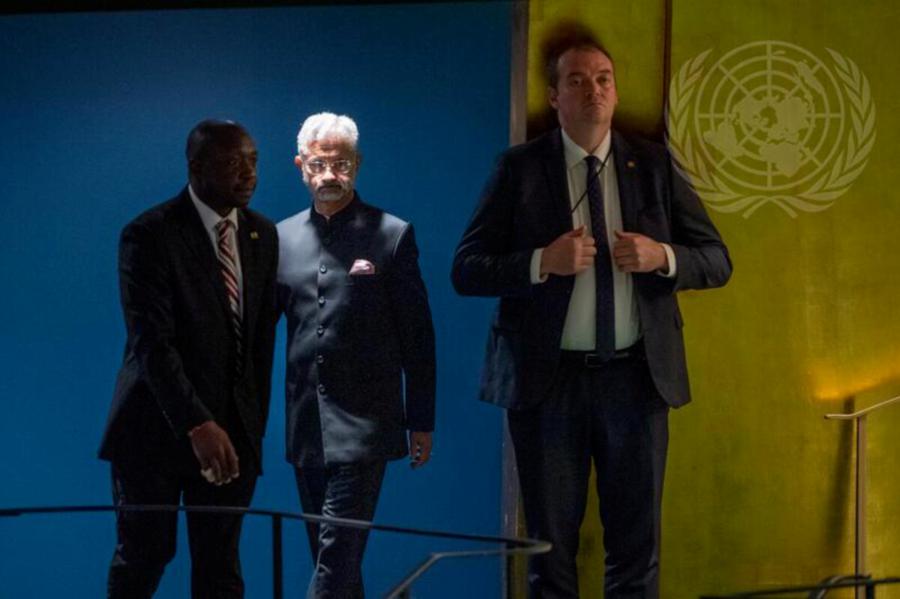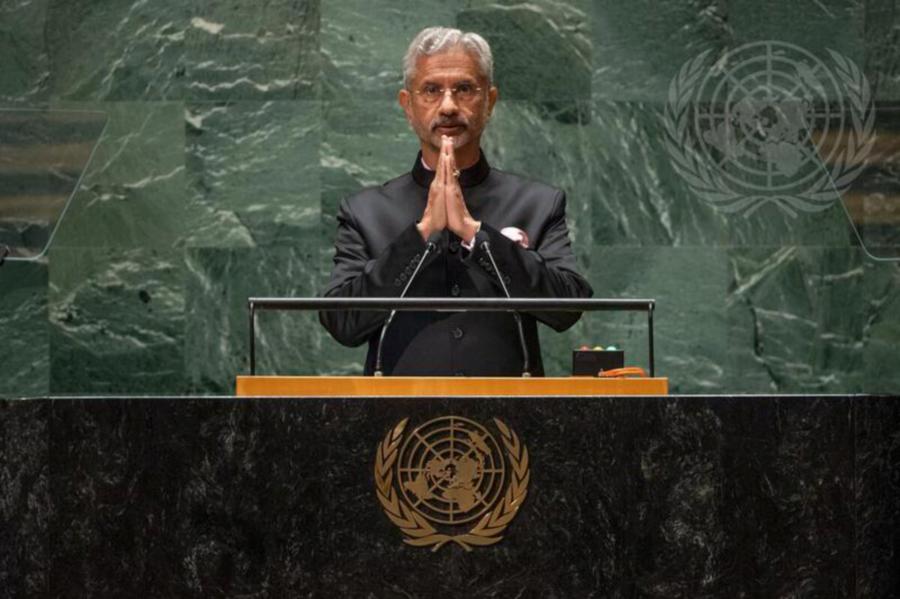UNITED NATIONS, New York: India has boldly staked its claim as the "leading power" of the Global South, pledging unwavering support and a commitment to collective growth in an "emerging multipolar order."
Addressing the United Nations General Assembly, India's External Affairs Minister Subrahmanyam Jaishankar made a compelling case for India's newfound role, signalling the end of an era where a select few dictated the world's agenda.
"The days when a few nations set the agenda and expected others to fall in line are over," he declared.
Jaishankar's remarks were subtly directed at China and Western powers, including the United States and Canada, given the backdrop of recent India-Canada diplomatic tensions and ongoing strains with China.
INDIA COMMITTED TO GLOBAL GOOD
As Jaishankar took the rostrum on Tuesday, he greeted the assembly with "Namaste from Bharat!" with folded hands.
He proceeded to address the "exceptional period of turmoil" currently affecting the world, acknowledging the structural inequities and uneven development, particularly in the Global South.
These issues, he said, have been exacerbated by the impact of the Covid-19 pandemic and ongoing conflicts.
Jaishankar expressed India's commitment to taking on greater responsibility and making more contributions on the global stage, pointing to its development partnerships with 78 nations and significant support provided to several countries, including in emergency situations.
"All nations pursue their national interests. We, in India, have never seen that as being in contradiction with global good.
"When we aspire to be a leading power, this is not for self-aggrandisement but to take on greater responsibility and make more contributions.
"The goals we have set for ourselves will make us different from all those whose rise preceded ours," the country's top diplomat said.
Jaishankar cited India's exemplary Vaccine Maitri initiative during the Covid-19 pandemic and its leadership in initiatives like the International Solar Alliance, the Coalition for Disaster Resilient Infrastructure, and the promotion of millets for global food security.
He also highlighted India's rapid response to international disasters, such as in Turkiye and Syria, and its timely assistance to Sri Lanka during a severe economic crisis.
Sri Lanka's economic woes have been attributed to Beijing's "debt diplomacy."
Jaishankar pointed out that even in distant regions, partners like the Pacific Islands have "appreciated our (India's) contributions in health, technology, and climate action."
Highlighting India's historical, geographical, and cultural significance, he said "so many nations" identified with India, closely following its experiences and evaluating its solutions for broader applicability.
The term "Global South" encompasses nations worldwide that are less developed and affluent than traditional "first-world" countries. Leaders from major developing nations, such as Brazil's Luiz Inacio Lula da Silva and India's Narendra Modi, have positioned themselves as leaders capable of uniting the Global South.
Recently, Lula's declaration at the UN meeting, asserting that "Brazil is back," was widely seen as a strategic move focused on the Global South. In January, Modi hosted a "Voice of the Global South" virtual summit.
Meanwhile, China, in its General Assembly address last week, presented itself as a member of the Global South, offering an alternative to what it has long criticised as "Western hegemony."
China's Vice President, Han Zheng, said: "As the largest developing country, China is a natural member of the Global South. It shares the same future with other developing countries."

Han also said China supports the Global South countries's development path "in keeping with their international conditions," adding that "China will remain a member of the big family of developing countries."
CALL FOR COLLABORATIVE GLOBAL ACTION
Turning to India's leadership at the recently concluded Group of 20 (G20) summit, Jaishankar highlighted the summit's theme, "One Earth, One Family, One Future."
He asserted that the G20 Leaders' Declaration embodies a commitment to "bridge divides, dismantle barriers, and cultivate collaboration," as was emphasised by India Prime Minister Narendra Modi.
"At a time when East-West polarisation is so sharp and North- South divide so deep", he said the Summit, held recently in New Delhi, focused on the "key concerns of the many, not just the narrow interests of a few."
"The international order is diverse and we must cater for divergences, if not differences.
"As the United Nations itself symbolises, finding common ground is an imperative. To listen to others and to respect their viewpoints, this is not weakness; it is the basics of cooperation," he said, adding that only then can collective efforts on global issues be successful.
He further noted that India's advocacy led to the African Union becoming a permanent member of the G20, a step toward broader representation that should inspire the UN to also make the Security Council contemporary.
"Broad representation is after all, a pre-requisite for both effectiveness and credibility," he added.
The outcomes of the New Delhi G20 Summit, he continued, will resonate for years, including through the Action Plan on Accelerating Progress on the Sustainable Development Goals and the significance of Lifestyles for Sustainable Development (LiFE) and the Green Development Pact for a Sustainable Future.
Jaishankar further emphasised India's willingness to collaborate with diverse partners, such as the Quad in the Indo-Pacific, the expansion of the BRICS (Brazil, Russian Federation, India, China, and South Africa) grouping, and the creation of the India-Middle East-Europe Economic Corridor.
He characterised this openness to cooperation as a "defining characteristic of the emerging multipolar order".
Referencing India's significant progress in poverty reduction and achieving the Sustainable Development Goals, he noted its innovative use of digital technology in public service delivery, noting that technology has opened up opportunities and inspired innovation.
He further called for a fair, equitable and democratic international order, expressing concern over issues like vaccine apartheid, climate action and the misuse of market power.
Looking ahead to next year's Summit of the Future, Jaishankar stressed the need "to champion fairness and reform multilateralism, including Security Council expansion".
He said a fair, equitable and democratic order will surely emerge, once "we all put our minds to it."
"For a start, that means ensuring that rule makers do not subjugate rule takers. After all, rules will work only when they apply equally to all.
"After all, rules will work only when they apply equally to all. We must never again allow an injustice like vaccine apartheid to recur. Climate action too cannot continue to witness an evasion of historical responsibilities.
"The power of markets should not be utilised to steer food and energy from the needy to the wealthy, nor must we countenance that political convenience determines responses to terrorism, extremism and violence," Jaishankar said in a veiled swipe at Canada.
Similarly, he said respect for territorial integrity and non-interference in internal affairs cannot be exercises in cherry picking.
"When reality departs from rhetoric, we must have the courage to call it out. Without genuine solidarity, there can never be real trust. This is very much the sentiment of the Global South."
India, he said, has entered the Amrit Kaal, a quarter century where "greater progress and transformation awaits us."
"We are confident that our talent and creativity, now so visibly unleashed, will power us forward.
"The world saw a glimpse of what is to come when our Chandrayaan-3 landed on the moon.
"Today, our message to the world is in digitally enabled governance and delivery, in the widening ambit of amenities and services, in rapidly growing infrastructure, and in our energetic Startup culture.
"It is visible too in vibrant cultural expressions, such as in the arts, yoga, wellness, and lifestyle.
"Our latest assertion is in a pathbreaking legislation to reserve one-third of the seats for women in our legislatures."
Jaishankar concluded his speech by expressing confidence in India's progress and transformation in the years to come, citing achievements in governance, infrastructure, cultural expressions, and legislative representation for women.
"I speak for a society where ancient traditions of democracy have struck deep modern roots. As a result, our thinking, approaches and actions are now more grounded and authentic.
"As a civilisational polity that embraces modernity, we bring both tradition and technology equally confidently to the table. It is this fusion that today defines India, that is Bharat."
NST specialist writer Tharanya Arumugam is a 2023 fellow of the United Nations Reham Al-Farra Memorial Journalism Fellowship.



